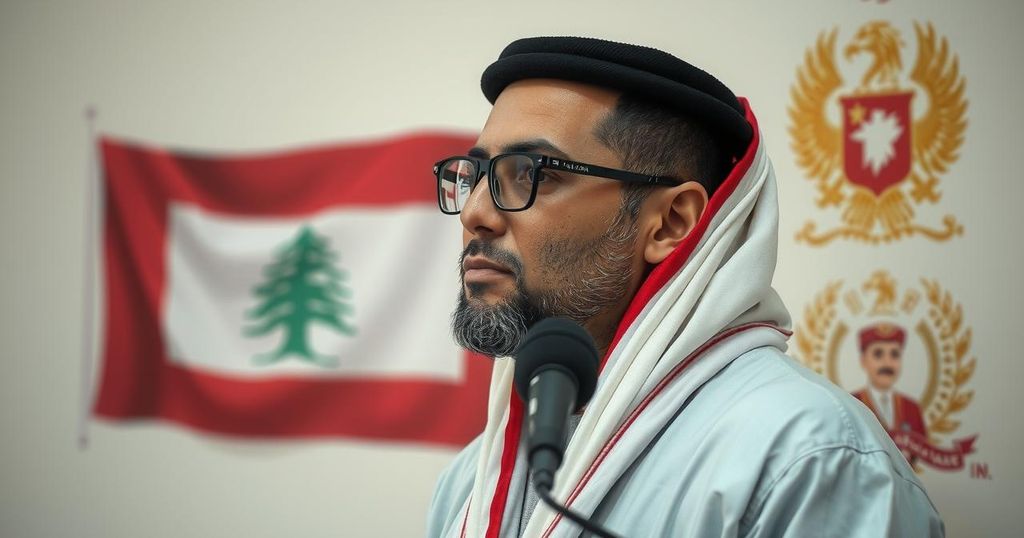Lebanon deported poet Abdulrahman Youssef al-Qardawi to the UAE, raising serious accusations of unlawful actions aimed at silencing dissent. Human Rights Watch voiced concerns for al-Qardawi’s safety, fearing torture and an unfair trial. This deportation, marked by charges of spreading false information, reveals Lebanon’s growing alignment with Gulf interests amidst ongoing human rights abuses historically observed in the UAE.
On Thursday, the Lebanese government deported Abdulrahman Youssef al-Qardawi, an Egyptian-Turkish poet, to the United Arab Emirates (UAE), which has sparked allegations from Human Rights Watch (HRW) that the deportation was unlawful and intended to suppress dissent. HRW indicated that al-Qardawi faces substantial risks of torture and an unfair trial upon his return to the UAE, deeming this action a serious breach of both international and domestic law.
HRW reported that al-Qardawi was initially detained on December 28, 2024, at the Masnaa border crossing following his return from Syria. He was arrested based on a provisional request from Egypt, with the UAE submitting its own extradition request shortly after, accusing him of disseminating false information and disturbing public order through social media. HRW denounced these charges as lacking recognition under international law, emphasizing that deporting individuals for peaceful expression undermines Lebanon’s adherence to the rule of law.
The Lebanese government moved forward with the deportation despite appeals from al-Qardawi’s lawyer, Mohammed Sablouh, who sought to halt the extradition process due to the significant threat of human rights abuses in both the UAE and Egypt. Amnesty International has also voiced concerns, asserting that al-Qardawi’s extradition poses a grave threat to his safety.
While Lebanese authorities claimed that the UAE promised fair treatment for al-Qardawi, HRW rebutted this assurance by highlighting the UAE’s documented history of human rights violations, including arbitrary detention and torture. The organization pointed out that al-Qardawi is not a UAE citizen and was not present in the country when the alleged offences occurred, which underscores an alarming trend of transnational repression against dissenters.
The decision to deport al-Qardawi intertwines with regional political dynamics and the influence of powerful Gulf states, marking Lebanon’s increasing alignment with Gulf interests amid its enduring crises. This unfolding situation is situated within the broader context of severe political repression in the region, where dissent often invites repressive responses.
Abdulrahman Youssef al-Qardawi’s deportation raises important concerns regarding Lebanon’s commitment to international human rights norms and the protection of individuals from political persecution. As international attention on this matter grows, it is imperative that global entities hold Lebanon responsible for acts that jeopardize fundamental freedoms and contravene the principles of the rule of law.
The deportation of Abdulrahman Youssef al-Qardawi from Lebanon to the UAE highlights ongoing issues surrounding freedom of expression and human rights within the region. The poet’s arrest and subsequent extradition reflect the broader climate of fear in which dissidents operate, particularly in states influenced by Gulf autocracies. This incident serves as a case study of Lebanon’s shifting political stance in response to external pressures, placing their commitment to human rights in question amidst regional upheavals.
In summary, Abdulrahman Youssef al-Qardawi’s deportation by Lebanon to the UAE raises significant legal and ethical questions regarding the protection of dissent and adherence to international human rights standards. The actions taken against al-Qardawi are indicative of deeper issues related to political repression and Lebanon’s alignment with Gulf state interests. As this case unfolds, scrutiny from international organizations is essential to ensure accountability for potential human rights violations.
Original Source: www.jurist.org






